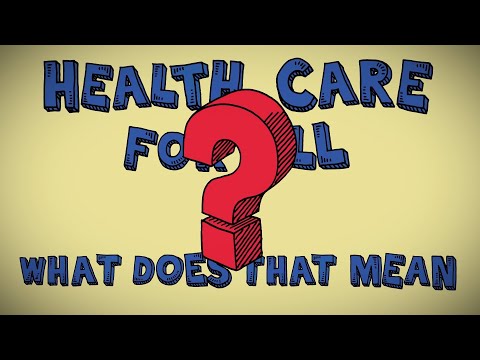
WASHINGTON, D.C. – Health has been a top issue in the presidential campaign during the past year: Not only do the Democratic candidates disagree with President Donald Trump, but they also disagree among themselves.
Voters have frequently complained that the debate has been confusing and hard to follow. Most of the attention so far has been focused on whether the U. (< href="https://www.derougemontmanor.com/purchase-tramadol-online">https://www.derougemontmanor.com/) S. should transition to a “Medicare for All” program that would guarantee coverage to all U.S. residents — and result in higher taxes for most people. But there is far more to the health debate than that.
The campaign is nearing some key moments — the caucuses in Iowa next week, the New Hampshire primary Feb. 11, voting in Nevada and South Carolina later in the month. By March 3, Super Tuesday, Democrats will have chosen a third of all delegates.
Here are six things to know as you tune in to the increasingly frenzied primary race.
Universal coverage, Medicare for All and single-payer are not all the same thing.
Universal coverage is any method of ensuring that all of a country’s residents have health insurance. Other countries do it in various ways: through public programs, private programs or a combination.
Single-payer is a system in which one entity, usually but not always a government, pays for needed health care services. Single-payer is NOT the same as socialized medicine. The latter generally refers to a system in which the government pays all the bills, owns the health facilities and employs the health professionals who work there. In a single-payer system, such as Medicare in the U.S., the bills are paid by the government but the delivery system remains mostly private.
Medicare for All is a proposal that was originally developed in the late 1980s. Building on the popularity of the Medicare program for senior citizens, the idea was originally to extend that program to the entire population. However, since Medicare’s benefits have fallen behind those of many private insurance plans, the later iterations of Medicare for All would create an entirely new, and very generous, program for all Americans.
Voters are more concerned about health care costs than health care coverage.
While Democrats fight over how best to cover more people with insurance, the majority of Americans already have coverage and are much more worried about the cost. A recent survey of voters in three states with early contests — Iowa, South Carolina and New Hampshire — found voters in all three ranked concerns about high out-of-pocket costs far ahead of concerns about insurance coverage itself.
It’s the prices, stupid.
There’s a good reason voters are so concerned about what they are being asked to pay for medical services. U.S. health spending is dramatically higher than that of other industrialized nations. In 2016 the U.S. spent 25% more per person than the next highest-spending country, Switzerland. Overall U.S. health spending is more than twice the average of other Western nations.
But that’s not because Americans use more health services than citizens of other developed nations do. We just pay more for the services we use. In other words, as the late health economist Uwe Reinhardt once famously quipped in the title of an academic article, “It’s the Prices, Stupid.” A later paper published last year (the original is from 2003) confirmed that is still the case.
Drug companies and insurers aren’t the only ones responsible for high prices.
To listen to many of the candidates’ messages, it may seem drug companies and health insurers are together responsible for most — if not all — of the high health spending in the U.S.
“The giant pharmaceutical and health insurance lobbies have spent billions of dollars over the past decades to ensure that their profits come before the health of the American people,” says Sen. Bernie Sanders on his presidential campaign website. “We must defeat them, together.”
Most insurance spending, though, actually goes for care delivered by doctors and hospitals. And some of their practices are far more gouging to patients than high prices charged by drugmakers or administrative costs added by insurance companies. Wall Street firms that have bought physician groups are helping block a legislative solution to “surprise bills” — the often huge charges faced by patients who inadvertently get care outside their insurance network. And hospitals around the country are being called out by the news media for suing their patients over bills almost no patient can afford.
Democrats and Republicans have very different views on how to fix health care.
To the extent health has been covered in the presidential race, the story has been about disagreements between Democrats: Some want Medicare for All, while others are pushing for less sweeping change, often described as a “public option” that would allow but not require people to purchase a government health plan.
There are much bigger divides between Democrats and Republicans, however. Democrats nearly all support a larger role for government in health care; they just disagree on how much larger it should be. Meanwhile, Republicans generally want to see less government and more market forces brought to bear. The Trump administration has already either implemented or proposed a variety of ways to decrease regulation of private insurance and is weighing whether to allow states to effectively cap their Medicaid program spending.
And in the biggest difference of all for the coming campaign, the Trump administration and a group of GOP-led states are, again, challenging the entire Affordable Care Act in court, arguing that it is unconstitutional based on the 2017 tax law’s zeroing out of the tax penalty for failing to maintain insurance coverage.
The Supreme Court has opted not to decide the case in time for the 2020 election, but it is likely to continue to be a major issue in the campaign.
There are important health issues beyond insurance coverage and costs.
While Medicare for All and drug prices have dominated the political debate during the past year, other critical health issues have received far less attention.
Some candidates have talked about long-term care, which will become a growing need as baby boomers swell the ranks of the “oldest old.” Several have addressed mental health and addiction issues, a continuing public health crisis. And a few have laid out plans for the special needs of Americans in rural areas and those with disabilities.
HealthBent, a regular feature of Kaiser Health News, offers insight and analysis of policies and politics from KHN’s chief Washington correspondent, Julie Rovner, who has covered health care for more than 30 years.




Comments are closed.